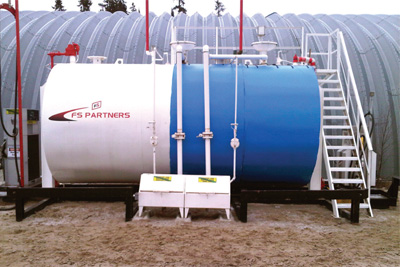
Miners at Kirkland Lake Gold are joking about putting on a little extra weight since switching to a blend of biofuel to power the mine’s underground equipment. The smell of French fries and fresh popcorn from loaders and personnel carriers wafts through the mine’s underground workings, conjuring up visions of greasy spoons and movie theatres.
Kirkland Lake Gold was using French fry oil, also called yellow grease, for a period of time, but has now switched to a soy-based product, said Tom O’Neill, of FS Partners, the company that supplies the fuel. The soybean product performs better and still “smells like French fries, popcorn, or something,” said O’Neill.
The gold miner’s switch to biofuel had nothing to do with stimulating the appetite of its workforce. The biofuel blend is cleaner-burning, safer and usually less expensive than miner’s diesel, said O’Neill, who manned a booth at the recent 5th annual Mining and Environment International Conference in Sudbury June 27 to 28.
FS Partners, based in Kitchener, Ontario, has been selling biofuel since 2004, but primarily to trucking companies, school bus fleets, municipal transit systems and farmers.
O’Neill turned his attention to the mining industry about two and a half years ago, thinking underground mines in particular would welcome an opportunity to reduce emissions.
Mining supplier Rainbow Concrete in Sudbury became a customer (Sudbury Mining Solutions Journal, June 2010), but convincing mining companies to make the switch has been more of a challenge.
Kirkland Lake Gold was the exception.
“They’re nothing to scoff at, but they’re a fraction of the size of everybody else and they could see the benefit of this, so they bought a 25,000 litre tank and we deliver when we’re up there with our tractor-trailers,” said O’Neill. “They’re running 50 per cent biofuel underground and 20 per cent on their above ground equipment. Depending on the blend, biofuel can reduce emissions by up to 80 per cent compared to conventional diesel.”
The soybean-based biofuel used by Kirkland Lake Gold is imported by FS Partners from the U.S. midwest and is normally 10 cents a litre less expensive than diesel, but flooding this spring and early summer forced several biofuel plants to shut down and caused prices to spike.
Biofuel is safer than miner’s diesel because it has a much higher flash point. Miner’s diesel can ignite at a temperature of 48 or 49 degrees Centigrade, but the flash point for a 50 per cent biofuel blend is 78 degrees Centigrade, said O’Neill.
“If you can buy a cheaper product that burns cleaner and is safer to store, it just makes sense. It’s not rocket science.”
Inco, he said, did some testing with soybean-based biofuel in the early ’90s and had really good results, but “they couldn’t get it and, when they could, it was astronomically priced.” However, there is better availability now, and more plants will likely come onstream as a result of a federal government regulation that came into effect July 1 requiring two per cent renewable fuel content in diesel fuel.
According to O’Neill, biofuel plants in Hamilton, Ontario and Montreal are exporting most of their product to Europe, where they can get a better price, forcing FS Partners to import its soybean product from the U.S.
Canada produces approximately 200 million litres of biodiesel annually and will need to more than double supply to meet government quotas.
Some of that supply could conceivably come from mining companies themselves growing biofuel crops on mine tailings, which has been proven viable as a result of demonstration projects by MIRARCO at Vale and Xstrata sites in the Sudbury Basin.


